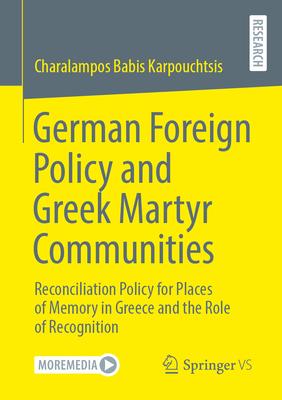The Euro crisis of 2008 had a deep impact on German-Greek relations. The exchange of blows in media, and amongst politicians created a deep divide and made old wounds visible - wounds that lie in the Occupation of Greece by Nazi Germany and its fascist allies during World War 2. In 2014 German foreign policy towards Greece shifted to include reconciliatory measures, marking the beginning of Germany’s foreign policy of reconciliation. One area of focus is memory culture and the Greek martyr communities, meaning villages and towns that experienced extreme violence, destruction, and executions. Diving into these places of terror and memory, the book analyzes German foreign policy of reconciliation while providing a profound view onto history, diplomacy, and the widely unknown Greek memory landscape. It entails a thorough review of German-Greek relations, more than seven unique maps and 10 case studies, accompanied by photographs and over 35 interviews. It shows how foreign policy, conflict and reconciliation intertwine and how international affairs meet the local level of everyday citizens.
| FindBook |
|
有 1 項符合
Babis Karpouchtsis的圖書 |
 |
$ 7199 | German Foreign Policy and Greek Martyr Communities: Reconciliation Policy for Places of Memory in Greece and the Role of Recognition
作者:Babis Karpouchtsis 出版社:Springer vs 出版日期:2024-05-04 語言:英文 規格:平裝 / 普通級/ 初版  看圖書介紹 看圖書介紹
|
|
|
圖書介紹 - 資料來源:博客來 評分:
圖書名稱:German Foreign Policy and Greek Martyr Communities: Reconciliation Policy for Places of Memory in Greece and the Role of Recognition
內容簡介
作者簡介
Charalampos - Babis Karpouchtsis is a political scientist with a background in foreign policy, strategy and memory studies. He finished his PhD in conflict and reconciliation studies in the Jena Center for Reconciliation Studies. He is a research associate in the University of the Armed Forces in Hamburg and a JCRS fellow.
|








